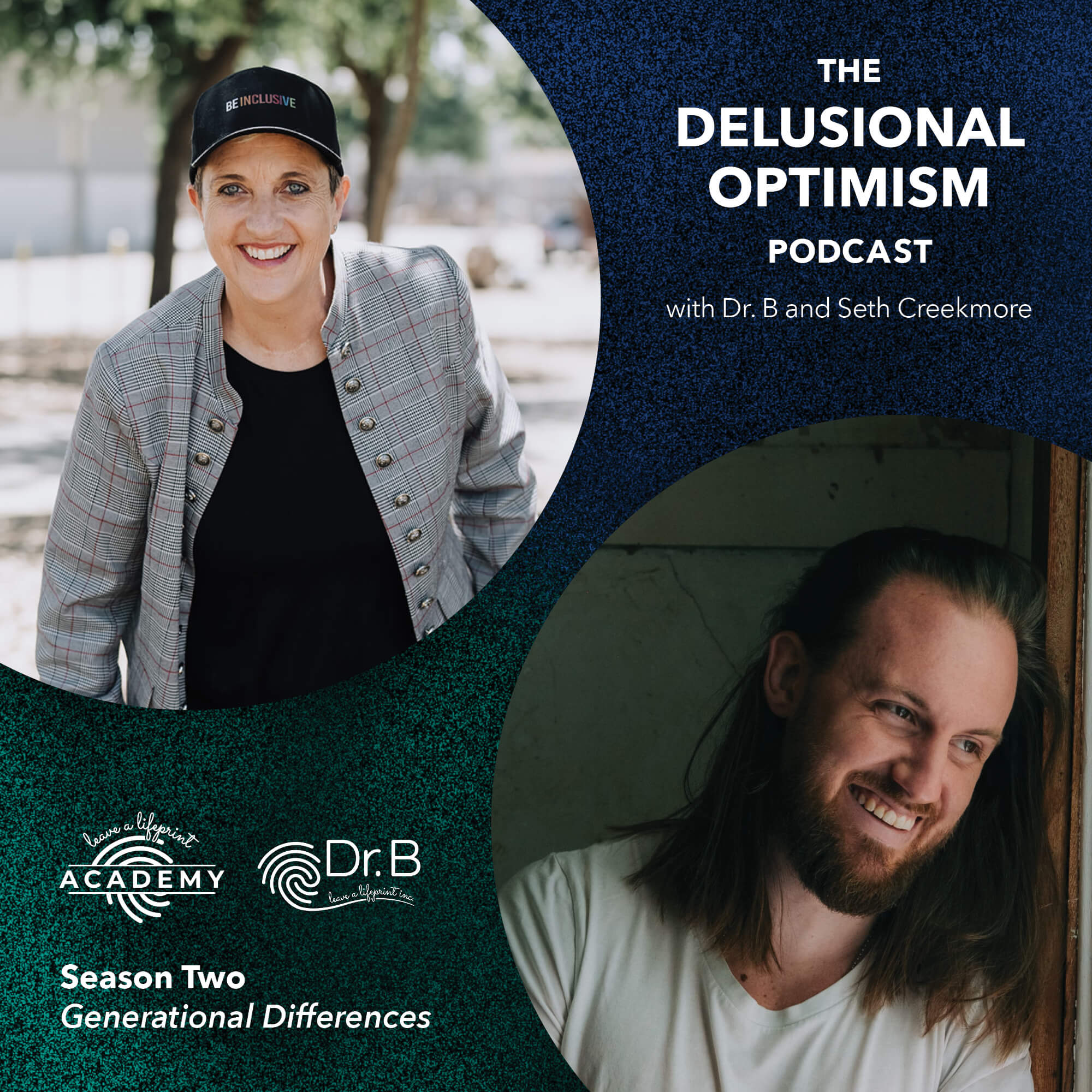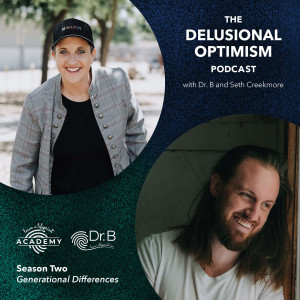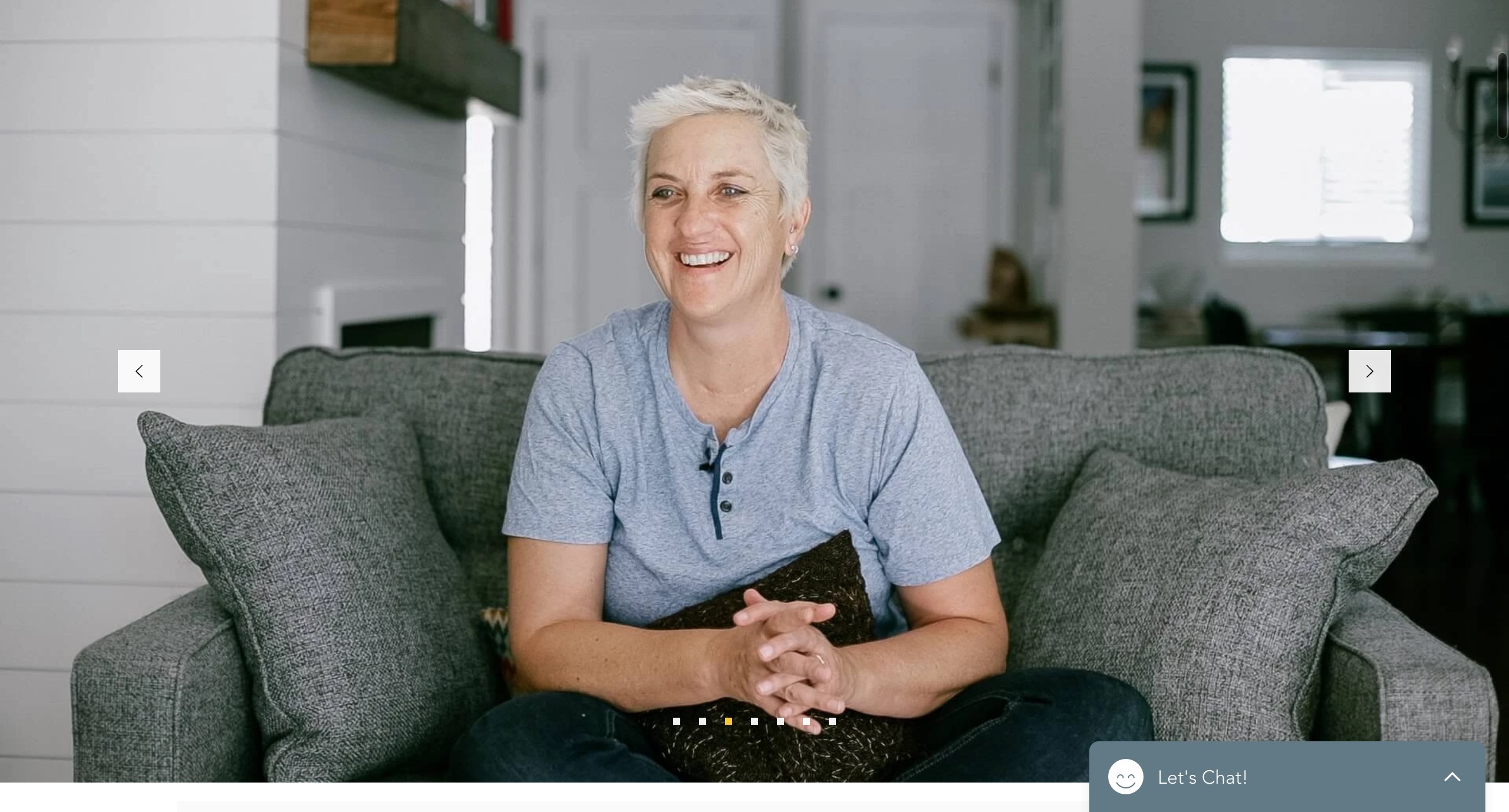
Are you interested in building a more diverse and equitable world? Do you want to learn how to communicate your emotions through a neuropsychological lens? Delusional Optimism with Dr. B is a podcast where we break down complex concepts into easy to understand actionable information. There are five overarching themes in Delusional Optimism; Resilience & Protective Factors Child Development & Parenting Emotions & Neuroscience Diversity & Equity In every episode, we will dig deeper into one or more of these bigger concepts and provide relatable stories and examples of how to approach the world with an informed and OPTIMISTIC mind! The goal is to connect and build a community that is open to learning how the brain works and what we can do to maximize our resilience, build protective factors into our world that support resilience from the beginning of life. Let’s Leave a Lifeprint!
Episodes

Monday May 17, 2021
Understanding the functions of the brain to improve our way of life (Part 2)
Monday May 17, 2021
Monday May 17, 2021
In part two of this two-part episode of Delusional Optimism, Dr. B and Seth Creekmore continue their conversation with Dr. Jerome D. Lubbe, known as the “Patient Doctor.” Dr. Jerome talks about how the Enneagram intersects with adverse childhood experiences (ACEs). He discusses the concept of neuroplasticity and the three intelligence sensors that correlate with most everyday life.
“If you understand what triggers you, then you start to understand what motivates you, not only what you’re trying to pursue, but what you’re trying to avoid.” - Dr. Jerome D. Lubbe [21:18]
“The trauma isn’t me. It is an experience. I’m having it. So how long can I manage it before it becomes a trauma or before I’m done and I’m out and I’m over it.” - Dr. B [30:04]
What You Will Learn:
[00:36] Intro
[01:45] What is ACEs
[04:14] The intersection between ACEs and Enneagram
[09:45] What is neuroplasticity
[12:44] Nurture, nature and discipline based conditioning
[14:01] Three intelligence sensors
[15:26] How it connects with ACEs
[24:19] What have helped Dr. B and Dr. Jerome
[34:29] Book recommendations
[37:48] Outro
Leave a lifeprint!
Resources:
Email Dr. B: contact@drbconnections.com
Visit her website: drbconnections.com
Connect with her on Facebook: facebook.com/dr.bconnections
Follow her on Instagram: instagram.com/dr.beasley
Visit Dr. Jerome D. Lubbe’s website: drjerome.com
Listen to the first part of the interview with Dr. Jerome: podbean.com/ew/pb-2i36h-102aac0
Visit Enneagram Prison Project: enneagramprisonproject.org
Visit National Institute for the Clinical Application of Behavioral Medicine (NICABM): nicabm.com
Dr. Jerome’s book recommendations:
Books by Daniel J. Siegel: amazon.com/Daniel-J.-Siegel/e/B00459LSPI%3F
1-2-3 Magic by Thomas W. Phelan: 123magic.com
Attached: The New Science of Adult Attachment and How It Can Help You Find - and Keep - Love by Amir Levine and Rachel Heller: attachedthebook.com
The Brain That Changes Itself: Stories of Personal Triumph from the Frontiers of Brain Science by Norman Doidge: amazon.com/Brain-That-Changes-Itself-Frontiers/dp/0143113100
The Brain's Way of Healing: Remarkable Discoveries and Recoveries from the Frontiers of Neuroplasticity by Norman Doidge: amazon.com/gp/product/B00KWG9L2A
Our partners:
ACEs Aware: acesaware.org
Every Neighborhood Partnership: everyneighborhood.org
Saint Agnes Medical Center: samc.com
Truth Work Media: truthworkmedia.com

Monday May 10, 2021
Understanding the functions of the brain to improve our way of life (Part 1)
Monday May 10, 2021
Monday May 10, 2021
In the first of a two-part episode of Delusional Optimism, Dr. B and Seth Creekmore talk with Dr. Jerome D. Lubbe, known as the “Patient Doctor.” Dr. Jerome talks about his work that specializes in complex, unresolved neurological cases and how he explores how functional neurology, neuroplasticity, and tools like the Enneagram can improve holistic well-being. He also discusses ways to help people, especially children, easily understand the function of the brain.
“If people took mental and emotional health and neurological therapies and they treated them the same way if they would if they went into the gym, they’d understand it’s not actually that complicated.” - Dr. Jerome D. Lubbe [13:06]
“This is what school needs to be about, like really just activating our brain in different ways and making it more dynamic and easy. Just easy for people. Why do we have to make everybody feel intimidated by medicine?” - Dr. B [14:54]
What You Will Learn:
[00:36] Intro
[02:00] Meet Jerome D. Lubbe
[06:53] Examples how he addresses certain issues
[09:21] How his work is tied to sensory processing
[14:54] Why this works so fast
[20:27] How to help kids understand
[29:44] Tips to help kids deal with the vaccine
[31:48] Outro
Leave a lifeprint!
Resources:
Email Dr. B: contact@drbconnections.com
Visit her website: www.drbconnections.com
Connect with her on Facebook: www.facebook.com/dr.bconnections
Follow her on Instagram: www.instagram.com/dr.beasley
Visit Dr. Jerome D. Lubbe’s website: www.drjerome.com
The Vaccine Book: Making the Right Decision for Your Child by Robert Sears
Our partners:
ACEs Aware: www.acesaware.org
Every Neighborhood Partnership: www.everyneighborhood.org
Saint Agnes Medical Center: www.samc.com
Truth Work Media: www.truthworkmedia.com

Monday May 03, 2021
Intergenerational Trauma and Oppression of Immigrant Communities
Monday May 03, 2021
Monday May 03, 2021
In this episode of Delusional Optimism, Dr. B and Seth Creekmore talk with Ashlee Hernandez about intergenerational trauma, immigration and oppression. Ashlee manages the Fresno County Trauma-Informed Network of Care (NoC) through the ACEs Aware Initiative. Ashley draws from her personal experiences to discuss how the intersectionality of immigration and oppression impact people through adverse childhood experiences (ACEs). Listen as they share how to heal from this trauma that crosses generations.
“It’s so important to talk about your trauma and share your story because someone could be listening that has a similar story and then that can speak to them and have them maybe not feel alone.” - Ashlee Hernandez [10:00]
“Voice is so important. When we recognize that we’re having an experience from childhood in our adult lives, just owning that and knowing it is so healing and powerful.” - Dr. B [20:16]
“You can blame as many people as you want, and yes, there’s a certain level of accountability that needs to be had, but really at the end of the day, it’s about your work. You have to do the work.” - Seth Creekmore [26:50]
What You Will Learn:
[00:36] Intro
[02:12] Ashlee’s family history with immigration
[07:15] The impact of intergenerational trauma
[12:09] What is intergenerational trauma
[16:03] Ways intergenerational trauma shows up in Ashlee’s life
[22:56] Why it’s important to recognize systemic difference
[31:08] Why we should shift our thinking around those receiving government assistance
[37:11] An actionable takeaway to work through intergenerational trauma
[39:05] Outro
Leave a lifeprint!
Resources:
Email Dr. B: contact@drbconnections.com
Visit her website: www.drbconnections.com
Connect with her on Facebook: www.facebook.com/dr.bconnections
Follow her on Instagram: www.instagram.com/dr.beasley
Our partners:
ACEs Aware: www.acesaware.org
Every Neighborhood Partnership: www.everyneighborhood.org
Saint Agnes Medical Center: www.samc.com
Truth Work Media: www.truthworkmedia.com

Monday Apr 26, 2021
ACEs: ADHD & Learning Differences
Monday Apr 26, 2021
Monday Apr 26, 2021
In this episode of Delusional Optimism, Dr. B and Seth Creekmore talk about attention deficit hyperactivity disorder (ADHD) and learning differences. They explain what they are and how they can show up in different forms. Listen as Dr. B shares some ways to help a child with a learning difference.
“Just recognizing that people learn differently and we don’t have to make it a disability or a bad thing. It’s all about relating.” - Dr. B [09:06]
What You Will Learn:
[00:36] Intro
[03:48] What is ADHD and learning differences
[06:26] How Seth communicates with his younger brother
[09:06] Recognizing that people learn differently
[14:07] ADHD and ADD in two forms
[20:00] Learn how to support a child with a learning difference
[25:06] How children learn best through their senses and whole body
[29:53] Some actionable takeaways
[38:34] Outro
Leave a lifeprint!
Resources:
Email Dr. B: contact@drbconnections.com
Visit her website: www.drbconnections.com
Connect with her on Facebook: www.facebook.com/dr.bconnections
Follow her on Instagram: www.instagram.com/dr.beasley
Our partners:
ACEs Aware: www.acesaware.org
Every Neighborhood Partnership: www.everyneighborhood.org
Saint Agnes Medical Center: www.samc.com
Truth Work Media: www.truthworkmedia.com

Monday Apr 19, 2021
Dr. B shares her story on the Talk Out Loud podcast
Monday Apr 19, 2021
Monday Apr 19, 2021
In this special episode of Delusional Optimism, Dr. B talks about coming out after being married to a man on the Talk Out Loud podcast with hosts Jeff Miller and Anthony Navarro. She shares how she navigated her life after she broke the news to her children and then-husband. She also talks about why it’s important to have a relationship with a good caregiver.
“The most powerful force in building resilience, which is the ability to overcome adversity, is one loving, attuned caregiver relationship. Somebody who can see you for who you are and love you for who you are under all circumstances.” - Dr. B [42:31]
What You Will Learn:
[00:37] Intro
[01:09] What to expect in this episode
[02:17] Dr. B’s childhood and family life
[13:13] Why it’s never too late to live your truth
[15:32] A neurological process some women go through
[17:03] Dr. B’s coming out story
[25:07] Her work with adverse childhood experiences
[31:24] How she had those tough conversation with her children
[35:57] Where to start the healing process with ACEs
[42:12] The importance of having a good caregiver relationship
[46:40] Why stories are so important
[51:35] The story behind the podcast’s name
[52:46] What they can expect to hear on Delusional Optimism
[1:02:44] Outro
Leave a lifeprint!
Resources:
Email Dr. B: contact@drbconnections.com
Visit her website: www.drbconnections.com
Connect with her on Facebook: www.facebook.com/dr.bconnections
Follow her on Instagram: www.instagram.com/dr.beasley
Listen to Talk Out Loud podcast: www.talk-outloud.com
Our partners:
ACEs Aware: www.acesaware.org
Every Neighborhood Partnership: www.everyneighborhood.org
Saint Agnes Medical Center: www.samc.com
Truth Work Media: www.truthworkmedia.com

Monday Apr 12, 2021
ACEs: Depressions & Anxiety are Best Friends
Monday Apr 12, 2021
Monday Apr 12, 2021
In this episode of Delusional Optimism, Dr. B and co-host Seth Creekmore talk about how depression and anxiety correlate with adverse childhood experiences (ACEs). They share how depression and anxiety can show up in teenagers and younger children and discuss the differences between feeling sad and depression. Listen as Dr. B shares practical tips to work through these two conditions.
“There’s a steady correlation between the higher number of adverse childhood experiences or ACEs, the more likely the person is to suffer from depression.” - Dr. B [04:58]
What You Will Learn:
[00:37] Intro
[03:18] The relationship between depression and anxiety with ACEs
[09:26] How depression and anxiety show up for teenagers and younger children
[12:53] How depression and anxiety show up
[19:14] The different between feeling sad and depression
[22:10] How to work through grief process through resilience
[25:51] Practical tips to work through depression and anxiety
[28:18] Outro
Leave a lifeprint!
Resources:
Email Dr. B: contact@drbconnections.com
Visit her website: www.drbconnections.com
Connect with her on Facebook: www.facebook.com/dr.bconnections
Follow her on Instagram: www.instagram.com/dr.beasley
Our partners:
ACEs Aware: www.acesaware.org
Every Neighborhood Partnership: www.everyneighborhood.org
Saint Agnes Medical Center: www.samc.com
Truth Work Media: www.truthworkmedia.com

Monday Apr 05, 2021
ACEs: Still Growing & Changing---Young Adults (19-24 years)
Monday Apr 05, 2021
Monday Apr 05, 2021
In this episode of Delusional Optimism, Dr. B and co-host Seth Creekmore talk about young adults, ages 19 to 24. They discuss the defining characteristics as this age group shifts from having a shared life with their parents to their own independent life with themselves, and how this age group relates to adverse childhood experiences (ACEs). Dr. B also shares what is going through a young adult’s brain when they act out. Listen for three ways parents can give their children resilience and support even if they may not agree with the decisions that they’re making.
“The need of this period in life is to separate. It’s very important for young adults to separate from their parents in order to find who they are in themselves, and then they can come back later and reconnect on an adult level.” - Dr. B [13:48]
What You Will Learn:
[00:37] Intro
[03:02] The defining characteristic of young adults
[04:32] ACEs and young adults
[06:48] High character, low health
[12:22] What’s going in a young adult’s brain when they act out
[20:01] What Dr. B has worked through as a parent
[23:26] Realization that mortality is real
[29:23] Three ways parents can give their children resilience and support
[36:34] Outro
Leave a lifeprint!
Resources:
Email Dr. B: contact@drbconnections.com
Visit her website: www.drbconnections.com
Connect with her on Facebook: www.facebook.com/dr.bconnections
Follow her on Instagram: www.instagram.com/dr.beasley
Our partners:
ACEs Aware: www.acesaware.org
Every Neighborhood Partnership: www.everyneighborhood.org
Saint Agnes Medical Center: www.samc.com
Truth Work Media: www.truthworkmedia.com

Monday Mar 29, 2021
ACEs: Tween & Teens: Sex, Drugs, Social Media & Suicide
Monday Mar 29, 2021
Monday Mar 29, 2021
In this episode of Delusional Optimism, Dr. B and co-host Seth Creekmore talk about tweens and teens. They talk about what parents need to know and the specific areas to address as they raise this age group. Dr. B discusses how to set boundaries as this age group experiences autonomy. Listen as she shares how to have those important, yet sometimes awkward, conversations about sex, drugs and the arts.
“Balancing out our adulthood with our emerging young adults, we’re teaching them to become adults like us.” - Dr. B [13:11]
What You Will Learn:
[00:37] Intro
[01:58] Awkward stories from Dr. B’s teen stage
[04:17] What to know about this stage
[06:44] Some specific areas to address in this age group
[14:06] How ACEs affect the competency to follow rules
[16:54] How to talk to this age group about music, sex and drugs
[25:31] How to enter into these conversations in a respectful way
[29:31] How to navigate conversations about bodies
[40:06] Some actionable takeaways
[45:15] Outro
Leave a lifeprint!
Resources:
Email Dr. B: contact@drbconnections.com
Visit her website: www.drbconnections.com
Connect with her on Facebook: www.facebook.com/dr.bconnections
Follow her on Instagram: www.instagram.com/dr.beasley
Our partners:
ACEs Aware: www.acesaware.org
Every Neighborhood Partnership: www.everyneighborhood.org
Saint Agnes Medical Center: www.samc.com
Truth Work Media: www.truthworkmedia.com

Monday Mar 22, 2021
ACEs: Signs in Middle Childhood--6-12 years old
Monday Mar 22, 2021
Monday Mar 22, 2021
In this episode of Delusional Optimism, Dr. B and co-host Seth Creekmore talk about raising children ages 6 to 12 years old, also referred to as middles. They discuss the typical difficulties with this age group and how to guide them through life topics such as death. Listen as they share advice on how to set rules and boundaries but also allow for flexibility.
“We don’t want kids to grow up and be so stuck in the black and white of a rule that it ends up being harmful to other people.” - Dr. B [26:41]
What You Will Learn:
[00:37] Intro
[03:10] What is a middle
[05:50] Why is there such a range between 6 to 12
[09:28] Typical difficulties and confusing points
[17:51] A Kids Book About series
[23:35] How to set up rules and boundaries
[32:41] Why it’s more about the structure
[35:57] Unity not uniformity
[38:08] The point of resilience and optimism
[40:11] Some actionable takeaways
[43:06] Outro
Leave a lifeprint!
Resources:
Email Dr. B: contact@drbconnections.com
Visit her website: www.drbconnections.com
Connect with her on Facebook: www.facebook.com/dr.bconnections
Follow her on Instagram: www.instagram.com/dr.beasley
Learn more A Kids Book About series: www.akidsbookabout.com
Our partners:
ACEs Aware: www.acesaware.org
Every Neighborhood Partnership: www.everyneighborhood.org
Saint Agnes Medical Center: www.samc.com
Truth Work Media: www.truthworkmedia.com

Monday Mar 15, 2021
ACEs: What about School Bullying?
Monday Mar 15, 2021
Monday Mar 15, 2021
In this episode of Delusional Optimism, Dr. B and co-host Seth Creekmore talk about bullying. Bullying is the second-leading cause of death between the ages 10 to 34 in the US and one in five students report bullying. Dr. B and Seth talk about how bullying integrates to our understanding of ACEs and what parents can do to help curtail this imbalance of power.
“When children are bullied or even adults are bullied, it leads to anxiety, depression, sleep problems, lower achievement in school and even a dropout rate that’s been reported by the CDC in 2018.” - Dr. B [05:15]
What You Will Learn:
[00:37] Intro
[02:17] What is bullying
[05:07] What happens to those who are bullied
[06:14] How the internet plays into bullying
[11:42] Bullying is typically two things: individual and systemic
[15:58] Why exposing young people to different cultures can curb bullying
[20:32] How to find the road to equity and battling disparity
[26:42] Why you should be a co-conspirator
[28:45] Some solutions to bullying
[38:31] Peer-to-peer programs
[41:42] What can parents do
[44:47] Outro
Leave a lifeprint!
Resources:
Email Dr. B: contact@drbconnections.com
Visit her website: www.drbconnections.com
Connect with her on Facebook: www.facebook.com/dr.bconnections
Follow her on Instagram: www.instagram.com/dr.beasley
Our partners:
ACEs Aware: www.acesaware.org
Every Neighborhood Partnership: www.everyneighborhood.org
Saint Agnes Medical Center: www.samc.com
Truth Work Media: www.truthworkmedia.com
